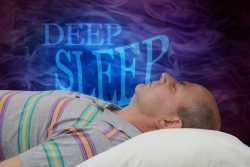 If you are stressed to the max you will be glad to know that researchers have discovered the type of sleep that is most apt to not only calm but also reset the anxious brain. It is deep sleep known as non rapid eye movement or NREM. This slow wave sleep allows neural oscillations to become highly synchronized which lead to drops in heart rates and blood pressure.
If you are stressed to the max you will be glad to know that researchers have discovered the type of sleep that is most apt to not only calm but also reset the anxious brain. It is deep sleep known as non rapid eye movement or NREM. This slow wave sleep allows neural oscillations to become highly synchronized which lead to drops in heart rates and blood pressure.
Researchers at UC Berkeley have identified this new function of deep sleep which is one that decreases anxiety overnight through reorganizing brain connections. This deep sleep appears to be a natural anxiety inhibitor as long as a person gets it each and every night.
The findings demonstrate one of the strongest neural links between anxiety and sleep to date. The team points out that sleep is a natural and non pharmaceutical remedy for a variety of anxiety disorders which have been diagnosed in 40 million American adults and the numbers are rising among teens and children. The research suggests that lack of sleep amplifies anxiety levels and conversely deep sleep helps reduce the stress.
Through a series of experiments utilizing MRI and polysomnography along with other measures, the team scanned the brains of 18 young adults while they viewed emotionally stirring video clips following a full night’s sleep and then again following a sleepless night. The levels of anxiety were measured after each session through a questionnaire which is known as the state trait anxiety inventory.
Following a night of no sleep, the brain scans indicated a shutdown of the medial prefrontal cortex, the part of the brain that helps us keep anxiety in check while the deeper emotional centers of the brain were overactive. The team believes that without sufficient sleep, the brain works overtime on the emotional accelerator pedal without sufficient braking.
Following a full night’s sleep when the participant’s brain waves were measured by electrodes placed on their heads, the results indicated their levels of anxiety declined significantly. This was especially true for those participants who had experienced more slow wave NREM sleep.
It appeared deep sleep or NREM sleep had restored the prefrontal mechanism of the brain which regulates our emotions thus lowering physiological and emotional reactivity thus preventing an escalation of anxiety.
The team also replicated the results in another study with 30 participants. Across all participants, the results once again showed that the participants who got more deep sleep experienced the lowest levels of anxiety the following day.
In addition to the lab experiments, the team conducted a study online in which they tracked 280 people of all ages on how both their anxiety levels and sleep changed over the course of four consecutive days. These results indicated that the quality and amount of sleep they got from one night to the next predicted how anxious they would feel the next day. Even very subtle nightly changes in their sleep affected their anxiety levels.
People who suffer from anxiety disorders routinely report experiencing disturbed sleep. However, very rarely is improvement in sleep considered as a clinical recommendation for reducing anxiety. The study shows not only a casual connection between anxiety and sleep, but it also defines the kind of NREM deep sleep a person needs to calm down the overanxious brain.
To view the original scientific study click below





